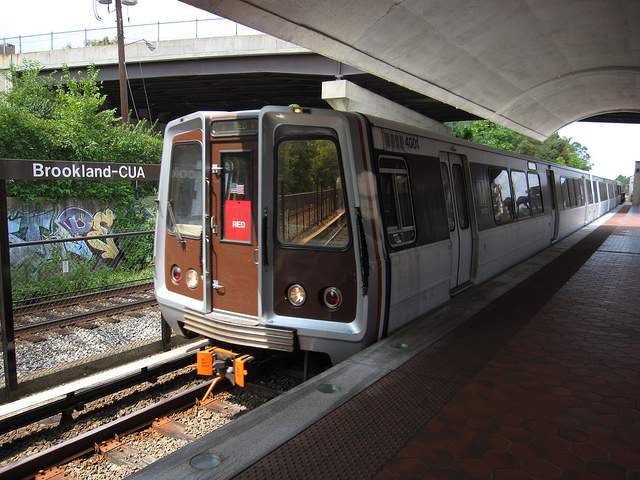By Kathleen Dailey ’14 and John Kruzel ’14
Brookland has been declared Metro’s most dangerous station and CUA students continue to be among the crime victims. In response to yesterday’s bad press, university officials have floated the idea of meeting with members of local law enforcement agencies. Meanwhile, CUA’s Department of Public Safety today said campus security is jurisdictionally barred from policing the subway stop. But is that really so?
If CUA’s Department of Public Safety is wrong — and there’s reason to think they’re wrong — CUA should assign a campus cop to patrol Brookland Metro immediately. If they’re right, they should make sure a meeting with law enforcement officials happens, and use it to push for concurrent jurisdiction over the Brookland station, or at the very least lean on Metro Transit Police to assign an officer to the beat. Both the law and the school’s security policy suggest they have the authority and obligation to do more than they’re doing now.
The crime wave at CUA’s Metro station has highlighted the school’s uneven approach to public safety. On one hand, CUA is absurdly overprotective: They place hand-washing instructions in the law school bathrooms and email students about “enhanced touch-point wipe-downs” (apparently giving CUA public safety the distinction of being the only people in human history to use this term as a neologism for cleaning). On the other hand, they recommend people use the Brookland Metro to get to and from campus. Yet the Public Safety Department doesn’t factor Metro crimes committed against students into their public safety statistics, which makes the crime rate appear unrealistically low and deprives school officials of leverage they could use to apply pressure to the Metro Transit Police and Metropolitan Police Department at a future meeting.
Under the current arrangement, the Metropolitan Police Department’s Chief of Police appoints special police officers to CUA. On campus property, school officers have full police authority, including the power to make arrests. It’s unclear what authority they would have on a Metro platform, but there’s reason to think a legal footing already exists for CUA police to hold concurrent jurisdiction that includes the power to arrest. Either way, the crime-deterrence value of an armed, uniformed police officer with limited arrest power is clearly better than the crime-deterrence value of nobody.
As the Metro Transit Police charter states, its members have concurrent jurisdiction with D.C. law enforcement. It also states that nothing in the charter should be interpreted as interfering with or relieving D.C. law enforcement officers’ duty to provide public safety. At most, this is tantamount to a statement that CUA’s concurrent jurisdiction already exists. At the very least, it suggests the Metro Transit Police might agree to allow CUA cops some policing duties at the Brookland station if the school sought this authority.
If other hurdles are in the way, statements on CUA’s Department of Public Safety website suggest they could be cleared through cooperation. It says the Department of Public Safety maintains a close working relationship with local law enforcement agencies, including the Metro Transit Police and Metropolitan Police proper. “Joint efforts are frequently undertaken with these agencies to address crime problems affecting the campus,” it adds.
In fairness, Metro Transit Police deserves the lion’s share of the blame for this year’s uptick in crime at the red-line stop. Enforcing the law on Metro property is their raison d’être. But if the school truly cares about enhancing student safety, they should start tracking crimes committed against students at the Brookland Metro in their annual report. They should also start assigning school police officers to monitor the station, seek the authority to do so, or lean on Metro Transit Police so that public safety at CUA becomes a reality instead of a talking point.

What I don’t understand is how someone is supposed to call to report suspicious activity, as recommended by Metro and the school, without brandishing their phone, thus putting them at risk of theft, also according to Metro and the school.
Great article. But can we change the name of the newspaper to “the redacted”.